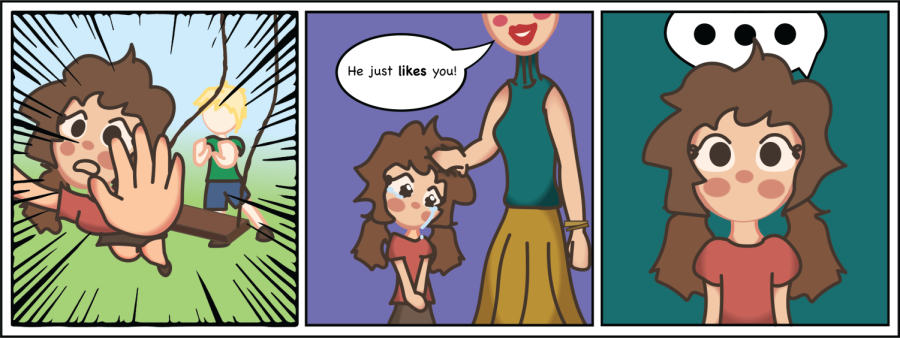The lessons we learn on the playground stick with us for the rest of our lives. Boys learn to run, jump, and play, all while getting out their energy during recess. Young girls, however, learn what it feels like to hit the mulch after being pushed to the ground by their male peers, all while their teachers defend the boys’ behavior in the sake of “just being boys.”
Male aggressive behavior is passed off as being a biological component of their sex, instead of a learned and taught practice. Chalking up violence to “boys being boys” oversimplifies the issue to the detriment of the peers who will deal with the violence in childhood, as well as later in adult life.
The implications of harmful phrases like these don’t just stop at girls. “Boys will be boys” has become a license for boys to treat their peers, male and female, with disrespect and violence. Aggressive behavior like this has become normalized, accepted, and expected well through adolescence and into adulthood.
One particularly painful consequence of these excuses is experienced by young girls. A common phrase told to young girls complaining of the violence they are subjected to by their male classmates is “he just likes you.” The normalization of boys acting out violently has molded the way we respond to girls experiencing it. Instead of accountability and discipline, we teach girls that boys might just not know how to express their romantic feelings, causing them to act out.
“It primes girls to expect that a certain amount of harassment just comes with the territory. That’s very dangerous. It also primes them to not confront the behavior. It makes them feel as if they have to accept it as the norm. It normalizes it,” author of middle grade novel Maybe He Just Likes You, Barbara Dee said.
“We expect boys to act in a certain way because after all, they’re boys and that’s what they are genetically predisposed to do. That’s not fair to girls, and it’s certainly not fair to boys,” Dee said.
Entitlement seen in young boys in playground or classroom settings is exacerbated into much more severe violence. Dr. Tamara O’Neal was killed in 2018 by her fiancé after breaking off an engagement. College student Mollie Tibbets was killed after telling a man who approached her while jogging to leave her alone. These stories don’t exist in isolation. They are part of a much bigger picture of excusing and accepting violence against women and girls, further encouraging boys to be sexist.
All violence begins with disrespect. When we teach our young boys that girls are below them, they act out in seemingly minor instances. While it seems as though these minute events don’t have much of an impact on girls, when the adults in their lives write it off as simply a symptom of their bully’s gender, they begin to believe it. Girls become more hesitant to speak out, seeing the disrespect they are subjected to as an inevitability. They view daily instances of sexism as a normality. Internalization of sexist myths as reality is a dangerous game played by adults that will lead us further down the path of sexism.
“We also need to get adults to pick up the signs,” Dee said.
Aside from instances of violence, sexism experienced during childhood has real implications on women into adulthood. For instance, a study published by the Becker Friedman Institute at the University of Chicago in 2018 found that sexism experienced in childhood affects the salaries of women later in their life. If a woman is raised in a highly sexist state, they are more likely to carry those beliefs throughout their life, even as they move to different states across the country. This devaluation of women is reflected into salary negotiations, promotions, and more.
While ending sexism on the playground or in the classroom might seem to have little-to-no effect, the opposite is true. Classrooms across the world have been permeated by sexism brought from patriarchal norms in society. The Center for Education & Youth reports that this in turn teaches students to accept this treatment as an inevitable reality, part of everyday life. When teachers challenge everyday sexism, however, it pushes students, parents, and staff to do the same.
The way we arrange classrooms and playgrounds, as well as initiate conversations inside them, has a direct impact on what girls internalize. For instance, posters depicting only male U.S. politicians in a classroom led Korean immigrant girls to believe that only men could fill roles like these. Teachers often comment on girls’ neatness, but boys’ physical strength. Children adopt these roles and attitudes and reflect them on themselves and peers, further perpetuating age-old stereotypes of the docility of girls and the strength of boys.
Children develop their gender identity and learn the differences between male and female around ages 3 to 5 according to Olaiya E. Aina and Petronella A. Cameron in the journal Dimensions of Early Childhood. This makes it especially imperative for teachers, parents, and other adults to focus on resisting stereotypes and sexism in childhood. The effects of long-term gender bias proliferates the most during adolescence. Stopping bias and stereotyping young is the solution to preventing it later in life.
A study published in 2016 by the Feminist Review found that although there has been significant work done to target boys’ attitudes towards violence against women and girls, an important component of the problem has been missing a solution. Without an emphasis placed on the internalization of societal norms and patriarchal myths, women and girls cannot overcome violence.
Another uncharted territory in tackling childhood sexism is teaching girls how to effectively communicate. Dealing with violence and bullying as a child is scary enough without an added component of underlying sexism. It becomes even more dangerous when girls are expecting for their experience to be downplayed and ignored, with little consideration for the fear and humiliation they feel.
“A lot of girls…really just don’t know how to advocate for themselves. They don’t know how to get adults to listen because they don’t know how to express how they feel about the behavior. It’s very confusing. It’s threatening,” Dee said.











